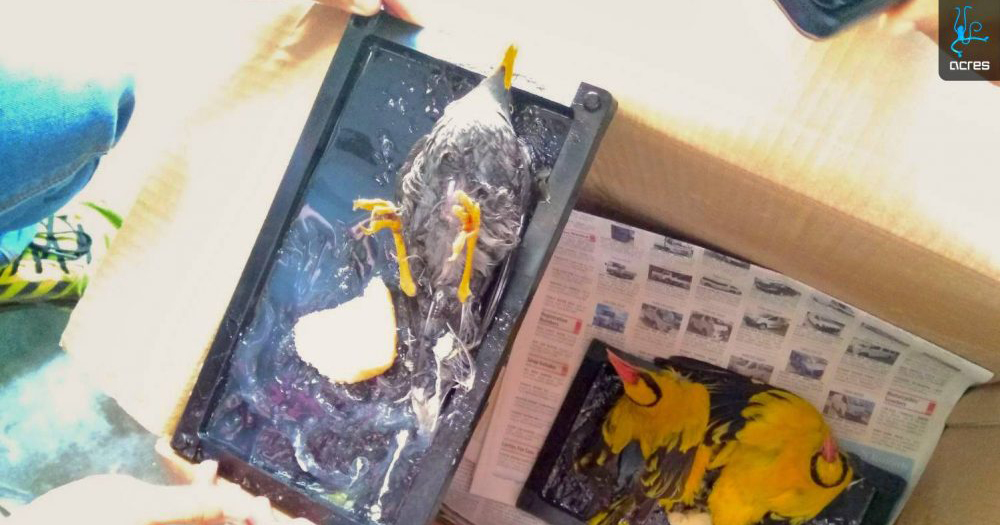This is pretty horrid.
It seems that birds are getting caught in glue traps meant for rodents, as seen in a Facebook post by ACRES: Animals Concerns Research and Education Society (Singapore) on Jan. 29.
According to ACRES, seven birds, which included orioles, mynahs, pigeons, and sparrows, were found stuck and distressed in glue traps in the space of 14 hours.
The trapped birds were found by concerned members of the public who then called the ACRES' 24-hour wildlife rescue hotline for assistance.
The location of the glue traps include:
- 920 East Coast Parkway
- Block 156 Lorong 1 Toa Payoh
- Upper East Coast road, at the East Coast Parkway Expressway exit to Bedok
- Race Course Road
It is understood that the traps set up at Toa Payoh had pieces of bread stuck on them, and the cheese-flavoured corn snack Cheezels were also found scattered on the grass patch nearby.
THE NIGHTMARE OF GLUE TRAPS CONTINUES
7 birds in 14 hours from five locations, from mynahs and pigeons, to sparrows and orioles.
Absolutely heartbreaking because just like you and I, they can feel pain, discomfort, fear and not to mention helplessness. And it’s frustrating that this continues.
Can they be banned?
Yes, New Zealand has done it: https://tinyurl.com/y97k2noz)
Can the sales of glue traps be regulated?
Yes, Victoria state government has done it: https://tinyurl.com/y85jx8he
Can the rodent population be managed humanely?
Yes, if we leave our reticulated pythons alone and manage our food waste and trash properly.
Can you help?
Definitely!
Write letters to your town councils to end using glue traps, write to supermarkets and stores to lift the cruel and inhumane glue boards off their shelves.
#GlueTrap #Inhumane #Singapore
[related_story]
What are glue traps?
[caption id="" align="alignnone" width="2272"] Photo via SB_Johnny on Wikimedia commons[/caption]
They're mostly cardboard, fiberboard or plastic trays filled with strong, sticky adhesive.
Most traps have food items placed in them as bait, to effectively ensnare and immobilise unsuspecting pests.
However, the adhesive doesn't kill them immediately. Instead, many animals starve and die after getting caught.
Sometimes, they even chew away their limbs in a vain attempt to free themselves, only to have their skin, fur or feathers ripped out from their bodies as they struggle.
The cruel and painful nature of the trap has alarmed animal rights groups such as ACRES and People for the Ethical Treatment of Animals (PETA ), who consider it an inhumane way of dealing with pests.
Glue traps are ineffective
Beyond ethical considerations, it's become less effective as a practical pest-catching tool.
In Apr. 2016, an article in The Straits Times pointed out that pest-busting industry practices such as the use of glue traps are fast becoming ineffective because rats are learning to avoid getting caught in them.
"Several pest busters told ST that common industry practices - such as using glue boards and cages to catch rats - have not caught up with evolving rodent behaviour."
Besides causing slow painful deaths to pests, there is a high possibility of unsuspecting animals such as house pets, birds and cats getting accidentally caught in them, making the trap a rather dangerous one.
Within the month of Jan. 2018 alone, ACRES has already received 15 calls related to birds in glue traps.
Previously, the group has also rescued civets, monitor lizards, tree shrew, squirrels and even snakes stuck to glue traps before.
Residents who find animals such as birds, cats and snakes a nuisance reportedly use these to traps to catch them.
However, this is a stop-gap measure which does nothing to change the ease of access to food and waste sources, which ACRES too identifies as a root problem.
Sadly, glue traps' widespread use and availability mean that they are easy to get hold of, and it might take some time to dissuade the public from using them.
Top image via ACRES's Facebook post
If you like what you read, follow us on Facebook, Instagram, Twitter and Telegram to get the latest updates.
